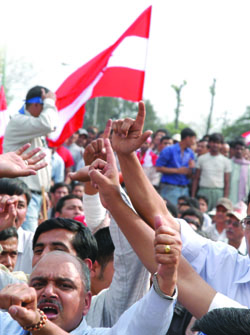 |
The question before Nepali Congress in the coming days is whether or not the party can retain its relevance. The party of KP Bhattarai has lost the last member of its founding trinity. Political leadership goes through several phases and its success is determined by ideological clarity, integrity, adherence to principles, management and organisational skills, understanding fluid situations, and the flexibility to deal with them. However, leadership's role in history is determined by its capacity to take risks.
BP Koirala took the risk of joining Tribhuvan Shah's cabinet under Indian pressure and ended up paying for that mistake for the rest of his life. He took another risk by accepting King Birendra's referendum result in 1980. Girija Koirala also took a risk by extracting the Maoists from the clutches of India and drank the hemlock by joining them in the 12-point agreement. But that decision allowed him to take the lead in the 2006 movement. And the reason his party took second place in the 2008 election was because of its inability to win the trust of the Madhes.
Historically, NC has taken the lead in most people's movements for democracy in Nepal. The only exception was the Madhes Movement, in which the party found itself on the wrong side, and showed once again that only progressive parties and revolutionary leadership can lead society.
Today, most of Nepali society's class divisions remain where they were. The quest for identity and respect remain undelivered. The administration is defunct, and the army still hasn't earned back its esteem. Public frustration may be directed against the political parties, but they are an expression of dissatisfaction with the status quo. It looks like the nation is ripe for another revolution.
But the precursor to revolution is never just outrage. As long as there is hope that tomorrow will be better than today, the people will not rise up. That point has not yet been reached.
The time is not right for the Maoists to lead another uprising, and a violent movement will not deliver anything but violence. And it will take more time for the Maoists to actually lead a non-violent movement. UML is a middle-of-the-road party of the middle class, and seems incapable of being a harbinger of change.
The current situation is just right for a re-designed Congress to take the lead, but the party lacks leadership qualities. They say a revolution devours its own children, and the children of the NC revolution of 1950 have gone with the slogans of nationalism, democracy and socialism.
Congress is a party of globalisation and capitalism. The party has no program to attract or inspire the people, but an even bigger problem than the lack of a program is the lack of leadership.
The first step is for Congress to show the difference between left-right ultra-nationalism and a broad nationalism that also placates the Madhes. A Congress without the Madhes will be a paper tiger. The new democracy must be inclusive and federal. A new constitution by 28 May looks impossible, but there is no alternative to the CA. The place for the people's representatives to show their presence is on the doorsteps of the people, in the villages and on the trails of this country. But where is Nepali Congress?
READ ALSO:
India to play Madhes card, Naya Patrika
Water going to ground, Nagarik


